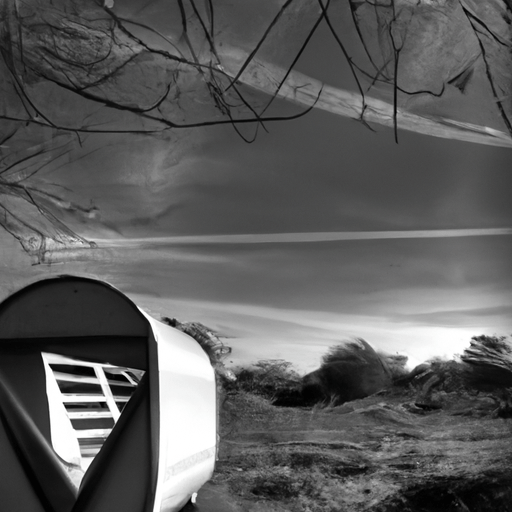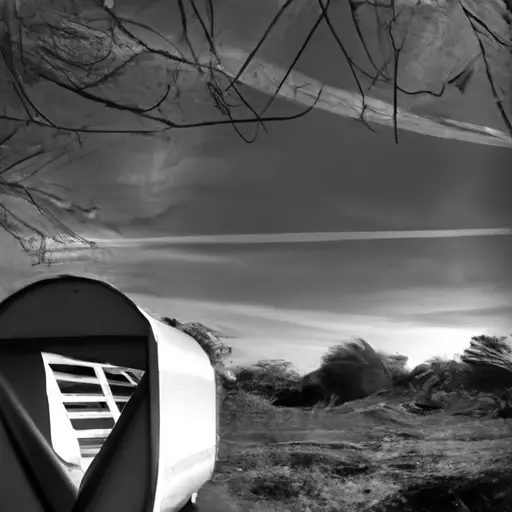Have you ever wondered if van life is actually cheaper than off-grid living? It’s a question that many people considering an alternative lifestyle are asking themselves. In this article, we will explore both options in detail and determine which one may be more budget-friendly. So, if you’re looking to escape the traditional trappings of city life and embrace a more adventurous and cost-effective lifestyle, keep reading to find out if van life or off-grid living is the right choice for you.
Let’s start by diving into the concept of off-grid living. This term refers to living independently without relying on public utilities such as electricity, water, and sewer systems. Off-grid living often involves creating self-sustaining systems, such as generating your own electricity through solar panels, harvesting rainwater for everyday use, and composting waste. While it may require an initial investment to set up these systems, the long-term savings can be substantial. However, it’s important to consider the cost of land, permits, and building materials if you’re planning to construct a sustainable off-grid home.
Now, let’s shift our focus to van life. Living in a van provides a nomadic and minimalist lifestyle, where you can travel to different destinations while having all your essentials within arm’s reach. Van life can be significantly cheaper than traditional living, as you eliminate mortgage or rent payments. Additionally, you can save on utilities, as many vans are equipped with solar panels and portable water systems. However, fuel costs, maintenance, and occasional parking fees should also be taken into account.
In this article, we will delve deeper into the financial aspects of both options, examining the costs associated with van conversions, off-grid home construction, and ongoing expenses. We’ll also explore the potential savings and benefits each lifestyle offers, including environmental factors and the overall freedom and flexibility they provide. By the end, you’ll have a better understanding of which lifestyle may make the most financial sense for you. So, let’s get started and discover if van life or off-grid living is a more affordable alternative to traditional living.

What is Off Grid Living?
Defining Off Grid Living
Off grid living refers to a lifestyle that is completely independent of public utilities, such as electricity and water supply. It involves living in a self-sustaining manner, relying on renewable energy sources, and minimizing one’s impact on the environment. In an off grid setup, individuals are responsible for generating their own power, sourcing their own water, and managing waste disposal.
The Basics of Off Grid Living
To embark on an off grid lifestyle, one must take several crucial steps. First and foremost, it is necessary to analyze and understand one’s energy needs. This includes assessing the power requirements for essential appliances, such as refrigeration, heating, and lighting. Next, individuals must invest in suitable renewable energy sources, such as solar panels or wind turbines, to generate electricity. Additionally, they must establish a reliable water supply system, which may involve drilling wells, using rainwater harvesting techniques, or utilizing natural water sources. Waste management also plays a vital role, as individuals need to find sustainable methods for composting and recycling.
Benefits of Off Grid Living
Off grid living offers a multitude of benefits, making it an attractive choice for many individuals. One of the primary advantages is the potential for substantial cost savings in the long run. By generating their own electricity and sourcing their own water, individuals can eliminate or drastically reduce monthly utility bills. Furthermore, off grid living promotes sustainability by reducing reliance on fossil fuels and mitigating carbon footprints. It also fosters a sense of self-sufficiency and independence, as individuals become less dependent on external resources and more in tune with their natural surroundings.
What is Van Life?
Understanding Van Life
Van life, on the other hand, involves living in a converted van instead of a traditional home. It is a nomadic lifestyle that emphasizes mobility, allowing individuals to explore different locations while still having a comfortable living space. Van life has gained popularity in recent years as a form of alternative living, offering the freedom to travel, experience nature, and simplify one’s material possessions.
The Nomadic Lifestyle
Van life is characterized by a sense of adventure and flexibility. Living in a van enables individuals to have the freedom to go wherever they desire at any given time. It allows for spontaneous road trips and the exploration of new places without the constraints of a fixed location. The nomadic lifestyle often appeals to those seeking a break from the monotony of traditional living and a desire for more experiences and connections with nature.
Advantages of Van Life
Van life offers a variety of benefits, both practical and experiential. One of the primary advantages is the potential for significant cost savings. Compared to traditional living arrangements, such as renting or buying a house, living in a van eliminates or drastically reduces expenses related to mortgage or rent payments. Additionally, van life eliminates the need for certain utilities, such as water and electricity, as many vans are equipped with solar panels and water tanks. The minimalist lifestyle associated with van life also promotes a sense of freedom, as it encourages individuals to declutter and prioritize what truly matters to them.
Comparing Costs
Examining Expenses
When considering the cost of off grid living versus van life, it is essential to examine the various expenses involved. In off grid living, the initial investment required to set up a self-sustaining system can be significant. This includes purchasing and installing solar panels, wind turbines, water storage tanks, and other necessary equipment. While these upfront costs can be significant, they are typically a one-time expense. On the other hand, van life requires a significant investment in purchasing and converting a suitable van into a livable space. This includes insulation, furniture, storage solutions, and other amenities to make the van comfortable for living.
Calculating Initial Investments
The initial investment for off grid living varies depending on the size of the system and the specific energy needs of the individual. On average, setting up a basic off grid system can range anywhere from $10,000 to $30,000. This includes the cost of solar panels, batteries, inverters, and other necessary components. In contrast, converting a van for van life can vary significantly depending on the extent of the conversion and the quality of materials used. On average, a basic van conversion can cost anywhere from $5,000 to $30,000. However, it is important to note that these figures are estimates and can fluctuate depending on individual preferences and requirements.
Maintenance Costs
Maintenance costs also differ between off grid living and van life. In off grid living, individuals need to ensure the proper functioning of solar panels, batteries, and other equipment. Regular maintenance, such as cleaning panels and replacing aging components, may be necessary to maximize efficiency and longevity. Similarly, van life requires ongoing maintenance, such as regular oil changes, tire rotations, and general upkeep of the van’s interior and exterior. While the actual maintenance costs will vary depending on the specific setup and usage, it is essential to budget for these regular expenses.

Housing Considerations
Choosing a Suitable Living Space
When considering off grid living, individuals have the flexibility to choose their preferred housing style. This could range from building a tiny house, purchasing a remote cabin, or living in an RV or camper. The choice of housing depends on personal preferences, lifestyle requirements, and financial resources. Each option has its own set of advantages and considerations.
Factors to Consider in Off Grid Housing
When evaluating off grid housing options, there are several factors to consider. The availability of natural resources, such as sunlight, wind, and water, is crucial, as these resources will determine the feasibility of generating power and sourcing water. Additionally, the location and accessibility of the property must be taken into account, as it may affect the logistics of setting up the off grid system and accessing necessities. Furthermore, proximity to amenities, such as grocery stores or healthcare facilities, should be considered to ensure a comfortable and convenient lifestyle.
Van Dwelling Pros and Cons
Van life, as a form of off grid living, has its own set of advantages and disadvantages. One of the primary benefits of van life is the freedom and mobility it offers. You have the ability to explore various locations and change your scenery as desired. Vans also provide a compact and efficient living space, with the ability to park and set up camp virtually anywhere. However, van life does have limitations in terms of space and amenities. Living in a van requires downsizing and minimalism, which may not suit everyone’s lifestyle or comfort level. Additionally, the lack of permanent address and limited space can pose challenges in terms of managing mail, accessing healthcare services, and establishing a sense of stability.
Energy and Utilities
Power Sources for Off Grid Living
Off grid living relies on various power sources to generate electricity. Solar panels are the most common and popular choice, as they harness the sun’s energy and convert it into usable power. Wind turbines can also be used to generate electricity, particularly in locations with consistent wind patterns. Hydropower is another option when living near a flowing water source. Additionally, backup generators or propane systems can be used for periods of low renewable energy production.
Van Life Energy Options
In van life, energy options often revolve around solar power due to the limited space and mobility of the van. Solar panels can be installed on the roof of the van to capture sunlight and convert it into electricity. This energy can then be stored in batteries, allowing for use during periods of low sunlight. Some van dwellers also utilize alternators in their vehicles to charge the batteries while driving. It is important to note that the energy requirements in a van are much lower compared to a traditional home, making solar power a practical and sufficient choice.
Utilities Cost Comparison
In terms of utilities, off grid living has the advantage of eliminating or drastically reducing monthly bills. Since individuals generate their own electricity and source their own water, they are not reliant on public utilities and their associated costs. However, the initial investment required to set up the off grid system must be accounted for. Van life, on the other hand, eliminates or reduces certain utilities, such as water and electricity bills, but may still require occasional expenses for campground fees or fuel for the van. Overall, both off grid living and van life offer the potential for considerable savings in utility costs compared to traditional living arrangements.
Food and Water
Sustainable Food Practices Off Grid
Off grid living promotes sustainable food practices by encouraging individuals to grow their own food. This can be achieved through traditional gardening, hydroponic systems, or even aquaponics. Off grid living also emphasizes the importance of composting and recycling food waste to minimize environmental impact. By producing their own food, individuals can reduce their reliance on external sources and ensure a fresh and organic supply.
Van Life Meal Planning and Expenses
Meal planning and expenses in van life require careful consideration due to limited space and resources. Van dwellers often opt for compact and non-perishable food items that do not require extensive refrigeration or cooking. This may include canned goods, dry staples, and dehydrated meals. While van life may limit the ability to grow your own food, it is still possible to incorporate sustainable practices through conscious food choices, supporting local farmers’ markets, and minimizing food waste.
Water Supply and Accessibility
Water supply is a crucial consideration in both off grid living and van life. Off grid living requires individuals to source their own water through methods such as rainwater harvesting or drilling wells. Water conservation techniques, such as low-flow fixtures and water recycling, can also be implemented to reduce consumption. In van life, water tanks are typically installed in the van, allowing for storage and access to water while on the road. Access to water can vary depending on location and the availability of public water sources or campgrounds with water hookups.
Social and Community Factors
Off Grid Living and Isolation
One aspect to consider in off grid living is the potential for isolation. Living in remote locations can limit social interactions and access to community resources. However, off grid communities and shared living arrangements have been gaining popularity, providing opportunities for like-minded individuals to come together and support each other. It is essential to weigh the benefits of solitude and privacy against the desire for social connections and community engagement when considering off grid living.
Van Life Lifestyle and Relationships
Van life, with its nomadic nature, also poses challenges in terms of relationships and social connections. While the freedom to travel and explore is liberating, it may also require sacrifices in terms of maintaining close relationships with family and friends. However, van life has its own supportive community, where individuals can connect with other van dwellers and share experiences and tips. Building relationships on the road or through online platforms can help alleviate feelings of isolation and create a sense of belonging in the van life community.
Joining Communities
In both off grid living and van life, joining communities can add an extra layer of support, companionship, and knowledge sharing. Many off grid communities exist worldwide, providing opportunities to live in a communal setting and pool resources for the benefit of all members. Van life communities also exist, allowing individuals to interact with fellow van dwellers, exchange information, and organize meetups and events. Being part of a community can help overcome challenges, offer a sense of belonging, and enhance the overall experience of either lifestyle.
Security and Safety
Ensuring Safety in Off Grid Living
Safety is a crucial consideration in off grid living, particularly when it comes to emergency preparedness. Reliable communication systems, such as satellite phones or two-way radios, should be in place in case of emergencies or isolation. Adequate fire safety measures, including smoke detectors and fire extinguishers, are essential to mitigate potential risks. Additionally, individuals should be well-versed in first aid and have proper medical supplies on hand. Proper research and understanding of the local environment, weather patterns, and potential hazards are key to ensuring safety in off grid living.
Van Life Security Measures
Security is also an important aspect of van life. While living on the road, individuals need to take precautions to protect themselves and their belongings. It is essential to choose safe and well-lit parking spots, preferably in designated areas or campgrounds. Vans should be equipped with secure locks and alarm systems to deter theft. Additionally, personal safety measures, such as self-defense training and awareness of surroundings, are important to ensure a safe and enjoyable van life experience.
Personal Well-being
Both off grid living and van life offer unique opportunities for personal well-being. The freedom to live off the grid or travel in a van can promote a sense of autonomy and self-sufficiency. The connection with nature and the ability to escape the hustle and bustle of urban life can contribute to mental and emotional well-being. However, it is important to recognize that these lifestyles also come with challenges and potential stressors. Prioritizing self-care, establishing routines, and finding ways to unwind and relax are crucial for maintaining overall well-being in either off grid living or van life.
Flexibility and Freedom
Off Grid Living and Autonomy
Off grid living offers individuals the autonomy to create their own sustainable lifestyle according to their values and preferences. The ability to generate and manage energy, grow your own food, and be self-reliant allows for a level of independence that is not present in traditional living arrangements. Off grid living provides the freedom to live in harmony with nature, make conscious choices, and have a positive impact on the environment.
Freedom in Van Life
Van life embodies the spirit of freedom and adventure. The ability to travel and explore different locations provides a level of freedom that is liberating for many individuals. Van dwellers have the flexibility to change their scenery, adapt to different environments, and embrace new experiences. The minimalist lifestyle associated with van life allows individuals to focus on experiences rather than material possessions, promoting a sense of freedom and prioritizing what truly matters.
Adapting to Different Environments
Both off grid living and van life require individuals to adapt to different environments and climates. Off grid living may involve relocating to remote or rural areas, necessitating adjustments to living conditions and access to resources. Van life, on the other hand, requires individuals to adapt to changing landscapes, weather conditions, and parking regulations. The ability to adapt and be resourceful is key to successfully navigating different environments and making the most of either lifestyle.
Conclusion
Weighing the Pros and Cons
In comparing van life to off grid living, it is important to consider the pros and cons of each lifestyle. Van life offers the freedom to travel, simplify, and reduce living expenses. It allows individuals to experience new places and foster a deep connection with nature while living in a compact and mobile space. Off grid living, on the other hand, offers the potential for significant cost savings in the long run, self-sufficiency, and a reduced environmental impact. It allows individuals to live sustainably, generate their own power, and source their own water.
Making an Informed Decision
The decision between van life and off grid living ultimately depends on individual preferences, lifestyle goals, and financial resources. Careful consideration should be given to factors such as cost, energy and utilities, housing considerations, social factors, security, and personal well-being. Researching both lifestyles, exploring communities, and connecting with individuals who are already living the lifestyle can provide valuable insights and help make an informed decision. Whether choosing van life or off grid living, it is essential to embrace the journey, be adaptable, and create a lifestyle that aligns with your values and aspirations.




